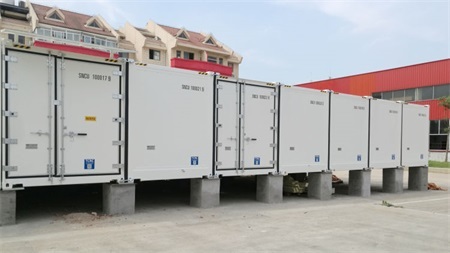Mobile cold storage containers become the market's "new favorite."
2019-05-08

Thanks to the booming fresh-food e-commerce market, mobile cold storage containers have become highly sought-after products in the market. A relevant official from CIMC Group told reporters during an interview that CIMC Taicang Refrigerated Logistics Equipment Co., Ltd. (hereinafter referred to as "Taicang Cold Box"), a subsidiary of the group, has successfully developed a large batch of mobile cold storage containers designed specifically for building cold-chain logistics warehouses, thanks to intensive research and development efforts. As a result, these innovative containers have quickly become the "new favorite" in the cold-chain logistics industry.
Urban cold storage facilities are shifting closer to the consumer end.
Currently, online shopping for fresh produce and grocery delivery services has become a popular consumption trend. Data shows that in 2017, China's fresh-food e-commerce market reached a transaction volume of approximately 139.13 billion yuan, surpassing 100 billion yuan for the first time, representing a year-on-year growth of 59.7%. In the first half of 2018, the transaction volume of fresh-food e-commerce stood at 105.16 billion yuan.
Benefiting from the growing consumption in fresh-e-commerce, coupled with national policies encouraging the development of cold-chain logistics, well-known enterprises such as Sinotrans, SF Express, Suning, JD.com, Meituan, and Ele.me have successively entered the market. The head of Taicang Cold-Box Marketing Service Department noted that currently, most major fresh-e-commerce platforms rely on a "two-stage" semi-cold-chain logistics model for delivery—leveraging inter-city trunk-line cold-chain transportation, using urban cold storage facilities as key nodes, and complementing the process with refrigerated vehicles and other temperature-controlled equipment to ensure doorstep delivery. However, employing specialized refrigerated vehicles for door-to-door delivery proves particularly costly when dealing with scattered residential buildings and individual, small-scale orders.
Many fresh-food enterprises have already been experimenting with setting up forward warehouses and expanding their physical store networks, using a "point-to-area" approach to build a three-kilometer-radius distribution system. Ultimately, at the final delivery stage, ice packs can be used to keep goods at low temperatures, significantly reducing the ongoing logistics costs associated with continuous refrigeration. "In response to the surging demand for cold-chain logistics, major fresh-e-commerce platforms are establishing forward cold storage facilities in areas close to city centers, aiming to enable efficient, short-distance delivery services," said the head of Taicang Cold Boxes.
Mobile cold storage containers become "highly sought-after items."
Based on market demand, CIMC Taicang Refrigerated Containers several years ago pooled its research resources to develop a large batch of mobile cold storage units designed specifically for building cold-chain logistics warehouses—and subsequently launched them into the market.
Technical personnel from Taicang Cold Box stated that CIMC Mobile Cold Storage Containers are designed and manufactured according to standard refrigerated container specifications. They are easy-to-assemble, modular cold storage units that can be easily disassembled and combined into multiple units. These containers can be mass-produced in factories and efficiently transported via standard modes of transportation such as highways and railways directly to the installation site. Moreover, their flexible configuration—achieved by assembling unit modules with varying functions and quantities—allows them to precisely meet diverse market demands.
"Currently, a mobile cold storage container is typically the size of a standard 40-foot shipping container, with an internal volume exceeding 60 cubic meters," said the technician. "However, these containers can be easily combined and integrated into larger units—without requiring every single unit to be equipped with its own refrigeration system. In fact, the combined storage capacity can range from 60 cubic meters all the way up to several thousand cubic meters, tailored precisely to meet customers' specific needs." Compared to traditional brick-and-mortar cold storage facilities, CIMC's mobile cold storage containers offer significant advantages: lower overall costs, shorter project timelines, greater flexibility and convenience in use, easy disassembly, portability, and even the ability to be recycled and reused. These features effectively address the shortcomings of conventional fixed cold storage solutions, providing a practical answer to the cold-chain warehousing challenges faced by major fresh-food e-commerce platforms. Today, users span more than 30 major cities across China, including Beijing, Shanghai, Shenzhen, Chongqing, Fuzhou, and Dalian—and the product has even expanded beyond Asia, reaching markets in Europe and Southeast Asia as well.
Diverse application scenarios point to a promising market.
Research institutions predict that China's fresh e-commerce market will reach 350 billion yuan this year. Fresh e-commerce relies heavily on cold-chain logistics; driven by this trend, China's cold-chain logistics market is expected to grow to 470 billion yuan over the next 3 to 5 years, with an annual compound growth rate exceeding 20%.
Currently, the country has been steadily introducing relevant policies to vigorously promote innovation and application of cold-chain logistics technology and equipment. It is accelerating the phasing out of non-standard, high-energy-consumption cold storage facilities while encouraging the construction of circulation-oriented cold storage facilities that better meet market demands. Additionally, the use of convenient and standardized cold-chain transport units, such as refrigerated containers, is being widely promoted. At the same time, enterprises are encouraged to adopt safe, environmentally friendly, and energy-efficient refrigerants and cooling technologies, develop new types of phase-change materials for cold storage, and integrate cutting-edge energy-saving and energy-storage equipment into their operations.
"Whether it's standard specifications or the materials used in container production, CIMC’s mobile cold storage containers fully comply with national policies," said a relevant official from CIMC Group. He added that these containers have far broader application prospects beyond just upgrading and building new urban cold storage facilities—they also hold significant potential in township markets and the railway cold-chain sector. On one hand, the nation is encouraging agricultural producers and certain on-site marketplaces to enhance their use of advanced cold-chain equipment, accelerating efforts to address the critical "first-mile" gap in cold-chain infrastructure at the source of agricultural products. On the other hand, China Railway Corporation is vigorously expanding its railway-based cold-chain logistics network, creating substantial demand for increased railway cold-chain capacity, larger cold-storage facilities, and refrigerated railcars (containers) alike.
Previous post:
Contact Us
Business contact:0086-512 33027708
Phone:0086-512 33027777
Email:xingbiao.shi@cimc.com
Address: No. 99 Binjiang Avenue, Taicang Port Economic and Technological Development Zone, Jiangsu Province







